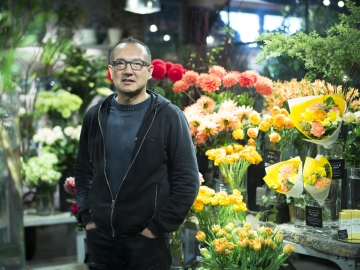Bridging Japan and Korea together through cultural exchange
Yoonjeong Choi ’04 ’15, CEO and producer of AI Entertainment
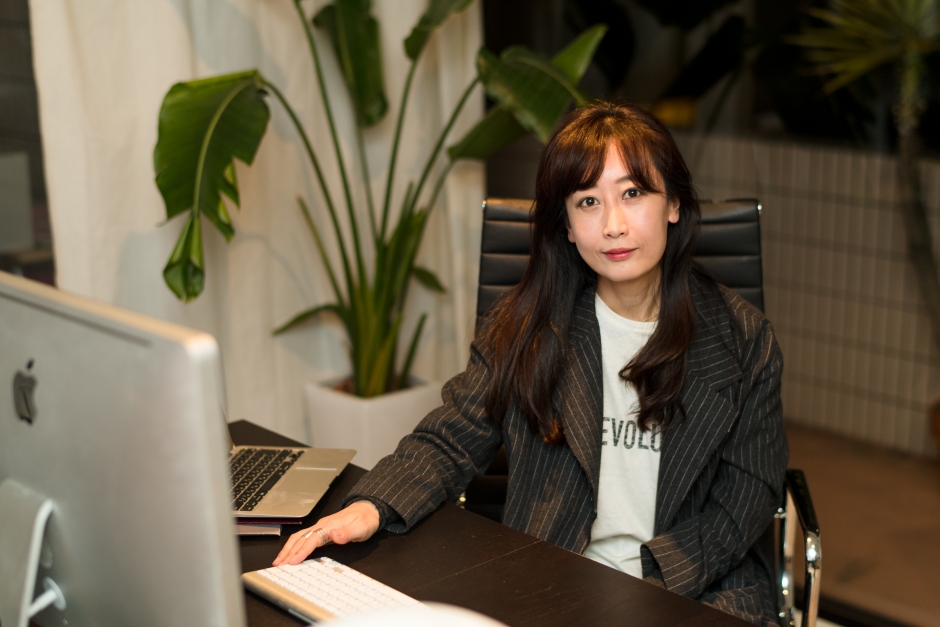
Yoonjeong Choi, CEO and producer of AI Entertainment
Yoonjeong Choi worked as a film art director before coming to Japan in 1999. When she was considering either studying abroad in Japan or the United States in 1998, the Korean wave hit Japan and accelerated cultural exchange between the two countries. Japanese content such as anime and film, which had been limited until then, flowed into Korea. This backed Choi to study film in Japan.
“I remember watching films by Akira Kurosawa and Takeshi Kitano as soon as Japanese films were imported to Korea. I was drawn into these films, especially after seeing “Hanabi” by Director Takeshi Kitano. Additionally, the pay in the Korean film industry was low at the time, so it was difficult to make ends meet even when working full time. In Japan, however, I could work part-time while studying with a student visa, as long as the working hours did not exceed 28 hours. This was one of the major factors that helped me make the decision to come to Japan.”
Not mere coincidence but fate
She knew from the very start that Waseda was where she wanted to go because Dong-ju Yun, a poet Choi admires, had studied abroad here.
“I thought that being able to study theater and film arts where my favorite poet had studied was not just mere coincidence but fate.”
But in reality, that was not the case.
“I found out that Dong-ju Yun studied at Rikkyo and Doshisha University after I enrolled. Though I wonder how I got the impression that he studied here, I laugh about this now because I had such an amazing experience at Waseda.”
After obtaining a Master’s degree from Waseda’s Graduate School of Letters, Arts, and Sciences and her Ph.D. from the Graduate School of Asia-Pacific Studies, Choi started her own company, AI Entertainment Inc. The company publishes AIM magazine to promote Korean culture in Japan, holds Korean calligraphy classes, organizes cultural programs such as a class on Korean literature, and produces rising Korean singers.
Choi’s success story may seem smooth, but the road to Waseda was a bumpy one. To be admitted to the particular program of her choice, Choi needed to pass the N1 level of the Japanese Language Proficiency Test. At the time, however, she could barely speak Japanese.
“I started Japanese language school in May of 1999. Even though the curriculum had started in April, I could not leave Korea until then because of film project I was involved with. I could not speak Japanese, started off late compared to my peers, and on top of that, the admission test for Waseda was scheduled within half a year. Everyone around me told me that passing the N1 test was impossible, and suggested that I try the N2 first.”
Luckily for Choi, working part-time in different positions, including staff at a ramen shop, helped her gain Japanese language skills.
“I worked at a barbeque restaurant, but the workers were all Korean, and baby-sitting was a one-person job. But everyone at the ramen shop was Japanese, and I was able to make friends my own age. The closer you become, the more engaged in conversations you want to be. Because of this, my Japanese improved in no time, and I passed the N1 test in six-month time. This story is kind of famous at the Japanese school I attended.”
Realizing the value of diversity
After passing the N1 test, Choi was successfully admitted to Waseda University. Choi studied as a non-degree student for a year and was later accepted to Waseda’s Graduate School of Letters, Arts, and Sciences.
“Because I had worked in the film industry in Korea, I chose to focus on modern Japanese film arts as my research topic. During the course, I had the opportunity to interview Yohei Taneda, an art director who has worked on famous Japanese films such as “Swallowtail” and “Hula Girls,” as well as many of Koki Mitani’s works, to write my thesis.”
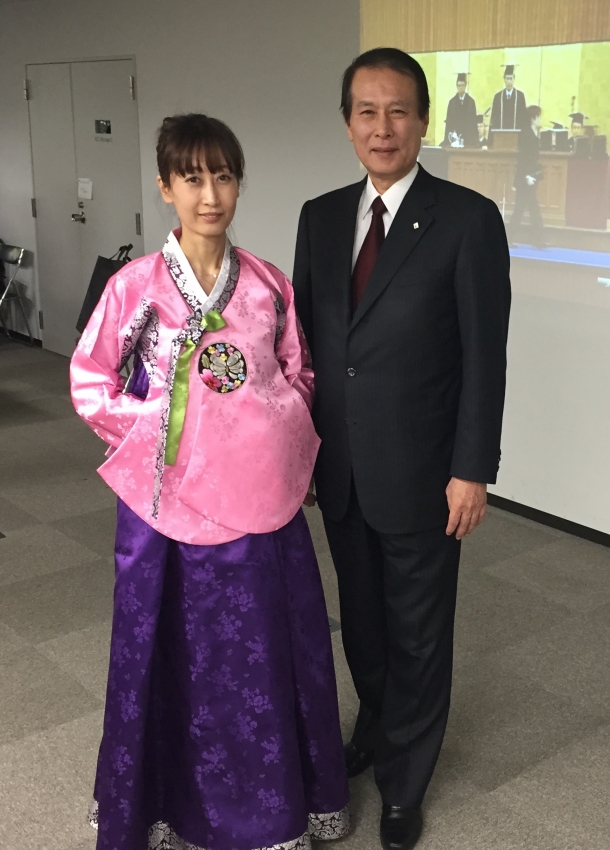
At her doctoral degree commencement with University President Kamata (photo provided by Choi)
Japan’s Korean wave was at its max when Choi was a graduate student, illustrated by how popular the drama “A Winter’s Sonata” was. This was when Choi started her own company to import Korean content to Japan, and in order to broaden her perspective, she enrolled in the Ph.D. program at the Graduate School of Asia-Pacific Studies. Her doctoral thesis was on the Korean wave consumption by Japanese middle-aged women, summarizing the nature of her work.
“Looking back, the most valuable lesson I learned at Waseda through my advisors from graduate studies, Professor Kenji Iwamoto (Graduate School of Letters, Arts, and Sciences) and Professor Kenichi Goto (Graduate School of Asia-Pacific Studies), was to appreciate diversity. There were equal number of Japanese and international students in my classes at the time. We were all from different places and age groups. Being able to freely engage in discussions with people from all kinds of backgrounds was such a rewarding experience. Waseda University and the professors here accept many international students to promote diversity. Because of my experiences here, diversity has become such a major theme for me when working as a producer to bring Japanese and Korean culture and people together.”
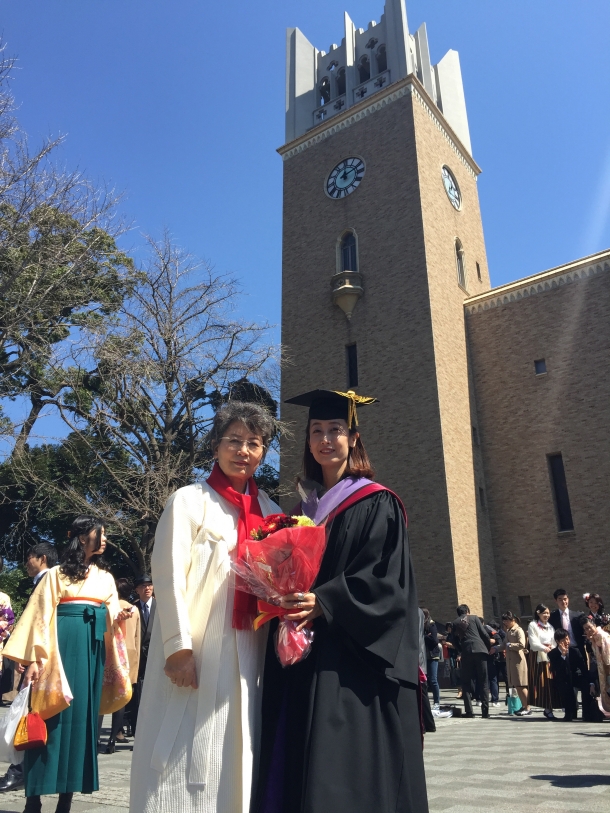
Choi’s mother came from Korea to celebrate her achievements (photo provided by Choi)
After graduating from Waseda, Choi has gone back and forth between Japan and Korea for her job. This year marks the 10th anniversary of her company, and she has been thinking about her company’s future more seriously.
“I have run my company for the past 10 years, and now, my ambition to make this company last for 100 years has become stronger. To do so, I need to have a clear vision of success. Until recently, I was focused on only what lied in front of me, but now I need to start thinking consciously about how to strategically manage my business. For motivation, I have even added the title ‘Chief Executive Officer’ into my business card recently.”
Something that Choi wants to emphasize and share with university students is the importance of diversity.
“I had to balance academics with work through graduate studies, but come to think about it, we must all fulfill multiple responsibilities. This could be balancing work and free time, or being a national citizen and community member. And also, even though I may be single now, there may come a time when I will not only be a mother but a mother as well. If we could keep the idea of diversity in mind, then we could probably relieve stress and manage multiple tasks. In that sense, meeting people with different values and thoughts, as well as background, is a precious time for students. I want current university students to learn through school, part-time work, or when they are travelling that so many countries and regions exist in the world. People from each of those countries and regions have different values. If Korea happens to be one of those countries the students get exposed to, that would make me very happy.”
Profile
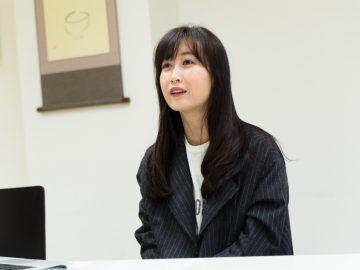 Yoonjeong Choi is originally from Seoul, Korea and came to Japan in 1999. She graduated with a Master’s degree in theater and film arts from Waseda University in 2004, and established AI Entertainment Inc., a record label and publishing company that supports Korean singers, in 2007. The same year, she enrolled in the doctoral program at Waseda’s Graduate School of Asia-Pacific Studies. She managed to balance academics with work and graduated with a Ph.D. in international relations in 2015. Currently, she goes back and forth between Japan and Korea for her business, introducing Korean culture through the entertainment magazine AIM, holding Korean culture classes such as lessons in Korean calligraphy, producing singers, and promoting Korean culture to Japanese people.
Yoonjeong Choi is originally from Seoul, Korea and came to Japan in 1999. She graduated with a Master’s degree in theater and film arts from Waseda University in 2004, and established AI Entertainment Inc., a record label and publishing company that supports Korean singers, in 2007. The same year, she enrolled in the doctoral program at Waseda’s Graduate School of Asia-Pacific Studies. She managed to balance academics with work and graduated with a Ph.D. in international relations in 2015. Currently, she goes back and forth between Japan and Korea for her business, introducing Korean culture through the entertainment magazine AIM, holding Korean culture classes such as lessons in Korean calligraphy, producing singers, and promoting Korean culture to Japanese people.

